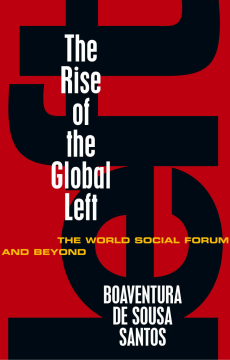
Additional Information
Book Details
Abstract
Leading sociologist Boaventura de Sousa Santos makes an impassioned case for the politicisation of the World Social Forum, arguing that its full potential as a force for social, economic and political change can be achieved only by taking a stand against neo-liberal globalization, war, famine and corruption. However, since its inception in Porto Alegre in 2001, the World Social Forum has refused to adopt political positions on world events, preferring instead to provide a platform that facilitates cooperation between diverse social movements.
Through a detailed analysis of the WSF's history and organization, he demonstrates that it has always been an inherently political organization, and argues that if the WSF is able to realise its potential as an institution for a new form of politics, it will become a global power to be reckoned with in the 21st century.
Boaventura de Sousa Santos is Professor of Sociology at the University of Coimbra in Portugal and a Distinguished Scholar of the Institute for Legal Studies at the University of Wisconsin-Madison. He is a leading Portuguese social theorist and has written and published widely on issues of globalization, sociology of law and the state, democratic theory, social movements and epistemology.
Table of Contents
| Section Title | Page | Action | Price |
|---|---|---|---|
| Cover\r | Cover | ||
| Contents | v | ||
| Tables and figures | viii | ||
| Preface | ix | ||
| Introduction: forty years of solitude and the novelty of the WSF | 1 | ||
| Notes | 9 | ||
| 1 | The WSF as critical utopia | 10 | ||
| 2 | The WSF as epistemology of the South | 13 | ||
| The World Social Forum and the sociology of absences | 15 | ||
| The World Social Forum and the sociology of emergences | 29 | ||
| 3 | The WSF as an insurgent cosmopolitan politics | 35 | ||
| A very broad conception of power and oppression | 36 | ||
| The equivalence between the principles of equality and recognition of difference | 37 | ||
| Rebellion and non-conformity | 38 | ||
| The WSF aims at a new internationalism | 38 | ||
| Transversal political terrains of resistance and alternative: an ongoing process | 39 | ||
| The struggle for radical democracy must be a struggle fordemo-diversity | 40 | ||
| Transcultural criteria | 40 | ||
| Promoting and strengthening counter-hegemonic forms of high-intensity democracy | 41 | ||
| No democracy without conditions of democracy | 43 | ||
| No global social justice without global cognitive justice | 44 | ||
| The many names for another possible world | 45 | ||
| Notes | 45 | ||
| 4 | Organizing fragmented counter-hegemonic energies | 46 | ||
| Internal democracy | 48 | ||
| Transparency and hierarchies in participation | 51 | ||
| Parties and movements | 55 | ||
| Size and continuity | 57 | ||
| The evaluation of the 2003 WSF | 58 | ||
| The Mumbai demonstration and the 2005 WSF | 72 | ||
| The 2006 polycentric WSF | 80 | ||
| Notes | 81 | ||
| 5 | Representing this world as it fights for another possible world | 85 | ||
| Who represents the WSF? Composition and functionality of the International Council | 100 | ||
| Notes | 107 | ||
| 6 | Making and unmaking cleavages: strategy and political action | 110 | ||
| Reform or revolution | 111 | ||
| Socialism or social emancipation | 113 | ||
| The state as enemy or potential ally | 114 | ||
| National or global struggles | 115 | ||
| Direct or institutional action | 117 | ||
| Equality or respect for difference | 119 | ||
| The WSF as a space or as a movement | 120 | ||
| Notes | 126 | ||
| 7 | The future of the WSF: self-democracy and the work of translation | 127 | ||
| Self-democracy | 129 | ||
| The work of translation | 131 | ||
| Notes | 146 | ||
| 8 | The WSF and self-learning: the Popular University of the Social Movements | 148 | ||
| A proposal for collective transformative self-learning | 149 | ||
| The PUSM, 2003–06 | 154 | ||
| Notes | 158 | ||
| 9 | The left after the WSF | 160 | ||
| The phantasmal relation between theory and practice | 160 | ||
| The twenty-first-century left: depolarized pluralities | 166 | ||
| Notes | 180 | ||
| Conclusion | 182 | ||
| Annexe I: Composition of the International Council of the WSF (2005) | 188 | ||
| Annexe II | 196 | ||
| Approved charter | 196 | ||
| Indian version | 198 | ||
| African version | 201 | ||
| Notes | 204 | ||
| Annexe III: Manifesto of Porto Alegre | 205 | ||
| Another world is possible: twelve proposals | 205 | ||
| Annexe IV: Financial support to the World Social Forums | 208 | ||
| Bibliography | 210 | ||
| Index | 216 |
